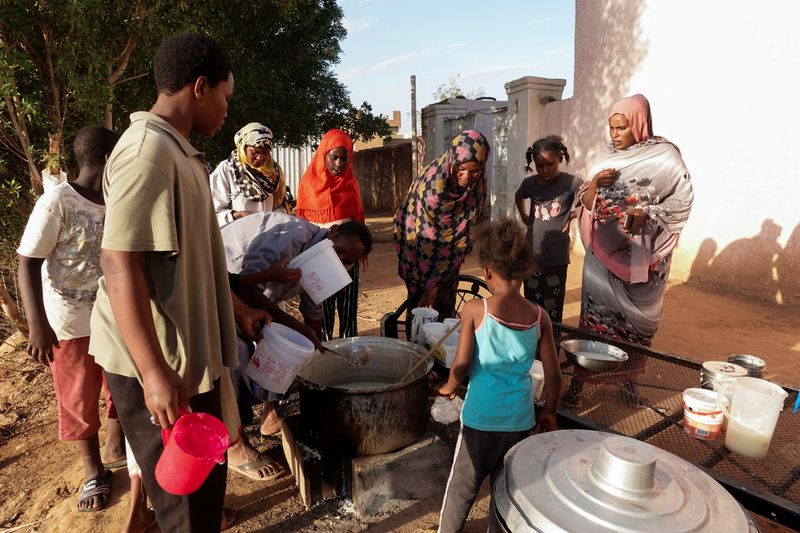By Yazan Kalach, Khalid Abdelaziz and El Tayeb Siddig
CAIRO/PORT SUDAN (Reuters) – After fleeing war in Sudan to Egypt, Mohamed Ismail says his ambitions are limited to putting food in the mouths of his five children on a meager monthly salary of around $100 earned in a factory card in Giza. .
A seven-year-old son sleeps in his arms due to the trauma of hearing the explosions before fleeing the outskirts of the Sudanese capital, Khartoum, in January.
A year of war between Sudan’s army and the paramilitary Rapid Support Forces (RSF) has forced more than 8.5 million people to flee their homes, creating the world’s largest displacement crisis and uprooting families many times over as people struggle to flee to neighboring countries with economic and security challenges. own problems.
Financial challenges have led some to return to the war-stricken capital.
“Being safe somewhere is the most important thing,” Ismail, 42, said. “We don’t even think about education because the economic situation doesn’t allow it. As a parent this really has an impact, but we are helpless.”
The war in Sudan broke out on April 15, 2023, following a planned political transition under which the army, led by Abdel Fattah al-Burhan, and the RSF, led by Mohamed Hamdan Dagalo, known as Hemedti, were in competition to protect their interests.
The fighting devastated the capital and unleashed waves of ethnic violence in the western Darfur region, before spreading to other areas including Gezira state, a major agricultural region that became an aid hub where many had sought refuge.
When the RSF entered the state’s main city, Wad Madani, in December, looting and occupying neighborhoods as they had done in the capital, many were uprooted for a second time.
‘LOST EVERYTHING’
Ahmed, 50, who had fled the capital with his wife and four children when the war began, said RSF troops pulled them out of a car as they tried to escape Wad Madani to seize the vehicle.
They headed east to al-Gedaref, where his 75-year-old mother-in-law died after the arduous three-day journey. They then paid smugglers to come to Egypt, which suspended visa-free entry for women, children and men over 50, as Sudanese poured across the border last year.
“Because of Al-Burhan and Hemedti, our lives were completely destroyed. We lost everything we owned,” Ahmed said, speaking by phone from Cairo. He asked to be identified by his name to avoid problems with the Egyptian authorities.
In Sudan, more than three million were already homeless due to conflicts preceding the current war, especially in Darfur, where RSF and its allies have been accused of widespread abuses and violence over the past 12 months that they have blamed on their rivals .
While some parts of the country, Africa’s third largest, remain relatively unscathed, many displaced people rely on charity as conditions worsen and nearly 5 million people face extreme hunger.
Sudan’s health system is collapsing, allowing outbreaks of diseases including measles and cholera. Aid agencies say the army limits access to humanitarian aid, and what little does get through is at risk of looting in RSF-controlled areas.
‘EXTRAORDINARY SUFFERING’
Both sides have denied hindering aid efforts. But on the ground, volunteer-run “emergency rooms” linked to the pro-democracy networks of the uprising that toppled former autocratic leader Omar al-Bashir in 2019 have been left to provide minimal food rations and keep some emergency services running. basic.
Ismail Kharif, a 37-year-old farmer living in a camp for displaced people near El Fasher, the capital of North Darfur, said people there risk fighting and are subject to retaliation from both sides if they try to move while they are being cut. out of healthcare, regular food supplies and telephone networks.
Across the country, in Port Sudan, tens of thousands of people have sought refuge under army control, but they wonder what lies ahead.
“You can’t imagine that one day you will live like this,” said Mashaer Ali, a 45-year-old mother of three from the capital, who lives in a center for displaced people in the Red Sea city. “Is this reality?” she said. “It’s very, very difficult.”
The war has created “one of the worst humanitarian and displacement crises in the world, and one of the most neglected and almost ignored, even though its implications, its repercussions and the suffering of the population are quite extraordinary,” said Filippo Grandi, Alto representative of the United Nations. Commissioner for Refugees, he said in an interview.
He warned that more Sudanese refugees could head to Europe if aid is not provided.
The displacement crisis continues as intervention by powers such as the United Arab Emirates and Iran risks prolonging the conflict and destabilizing the region around Sudan.
Hundreds of thousands have fled to Egypt, Chad and South Sudan, while smaller numbers have fled to Ethiopia and the Central African Republic.
South Sudan’s oil exports, which pass through Sudan and are an important source of income, have recently been disrupted by the war.

This has led to rising prices, said Imad Mohieldin, a guitarist known in Sudan as Imad Babo, who struggles like others to make a living in South Sudan’s capital, Juba.
“My profession and my life is music… (but) there is no place for music in wartime,” he told Reuters by phone. “Now we look for hope in the unknown.”